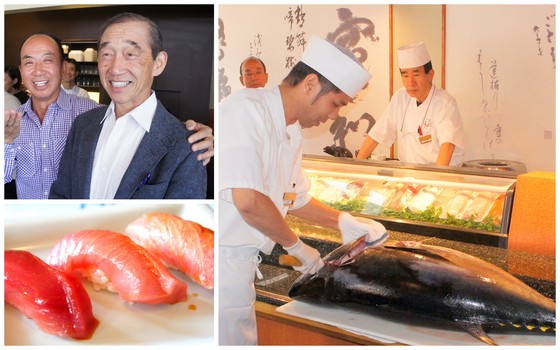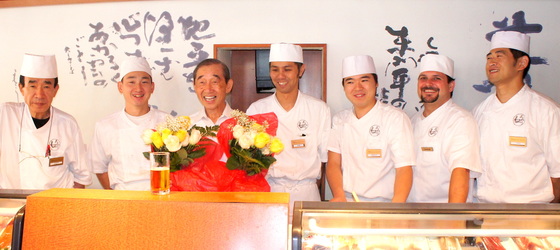Here's something a lot of people who eat sushi don't know: it's not about the "freshest" fish. On the contrary, virtually all the fish served at a sushi bar spends a minimum of three days frozen solid to kill any parasites. The trick to sushi isn't just slicing (that's the least of it) but knowing which fish to buy, when to buy it, and having the technical skill to break it down.
The 73-lb. whole bluefin tuna that was displayed on the counter at Shiro's in Belltown this past Wednesday was farm-raised (as is most Japanese tuna these days, owing to the increased demand from China), and purchased frozen, back in December, for about $2,000. The bright and succulent Copper River salmon that drapes over the sush rice? It was purchased at the peak of its season in the spring, flash frozen, warehoused, and delivered daily to the restaurant. That giant tuna? Once its skin, fins and bones are properly removed, the three-year-old bluefin will yield about 50 lbs of sushi-grade tuna: deep red akami, actually the lowest grade; the lighter chutoro; and, from the belly, the almost translucent pink otoro.
As you progress up the ladder of refinement, the tuna is increasingly delicate and yet more complex, like a so-called "vertical" tasting of exquisite older grand cru Burgundies. Rich in omega oils, this is more "butter" than fish.
Shiro's is the only restaurant in town with a line at the door half an hour before it opens, sometimes only a handful of Japanese tourists but often a cluster of a dozen or more seeking a spot at the 11-seat sushi bar. For out-of-towners, a traditional edomae dinner of locally caught seafood at Shiro's is a culinary pilgrimage, the highlight of a visit to Seattle. Some are drawn as well by the fame of a documentary titled "Jiro Dreams of Sushi," which featured a hardworking apprentice, Daisuke Nazakawa, who moved to Seattle as an understudy to Shiro. It was not to be. Daisuke was lured to New York after only a few months, where he is treated like a rock star.
Shiro Kashiba opened his own place in 1994 after a decades-long apprenticeship in Tokyo and a stint at the Westin Hotel (where he launched The Maneki, Seattle's first sushi parlor). He sold a controlling interest in Shiro's to one of his Japanese "competitors," Yoshi Yokoyama, when he reached "retirement age" in 2007, but continued to work the sushi counter two or three nights a week until this past April.
To celebrate the restaurant's 20th anniversary, Yokoyama introduced a new lineup of chefs led by seafood expert Jun Takai and sushi veteran Toshio Matsudo. They will continue Shiro's mission: a menu of 25 or so classics: broiled yellowtail collar; broiled black cod; "Belltown" poke of tuna with Shiro's signature spicy sauce; fresh as well as deep-fried oysters; geoduck; and, of course, the Chef's Selection omakase dinners, which start at $25 for eight pieces of sushi and half a roll. A "regular" assortment of sashimi, 13 pieces, is under $30; the chefs decide what you get.
For his part, the energetic Yokoyama has just opened a restaurant in San Francisco, Kasukabe, and continues to operate I Love Sushi in Bellevue. He won't change the popular Shiro Roll (pickled ginger, mackerel, shiso leaf, sesame seeds) but has no plans to add anything as unorthodox as an avocado.
By training and temperament, Shiro was (and remains) a traditionalist. Guests who expect (and sometimes demand!) unusual preparations like "fusion rolls" are politely shown the door with the suggestion that Wasabi Bistro, a trendy joint one block south, might be more accommodating. Myself, I remember telling Shiro, after half a dozen visits, that I was ready for something "more adventurous." I might as well have asked Bach to improvise "An American in Paris." At any rate, Shiro set me straight: the adventure is created within a formal framework, in the pleasure of each piece of fish, in the satisfaction of the experience.
Dropping by his old haunts to meet the new crew, Shiro-san told me yesterday that he's still looking for a space where he can serve the edomae style of sushi perhaps five days a week. That would give him back a measure of independence and two days a week to work on his golf game. "My sushi is better than my golf," he said. "Much, much better."
Shiro's, 2401 Second Avenue, Seattle. 206443-9844


Leave a comment